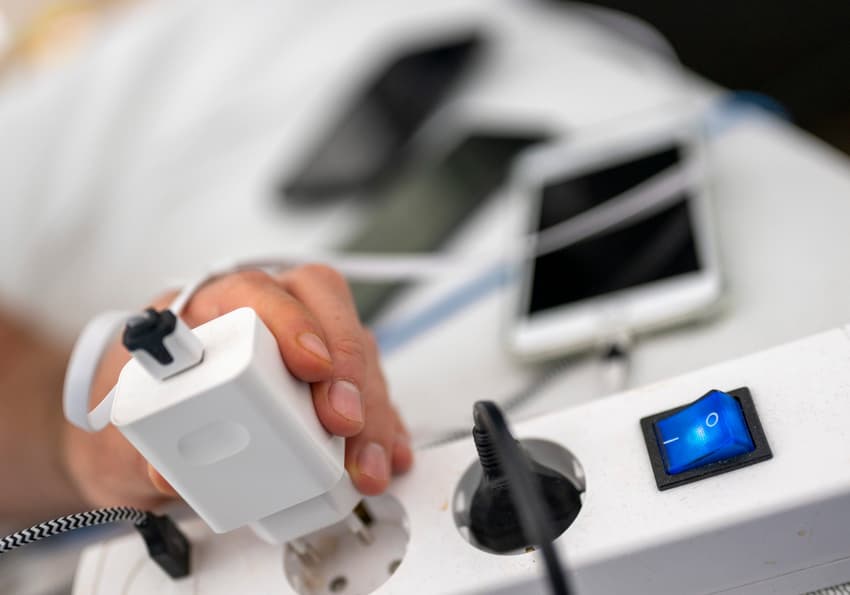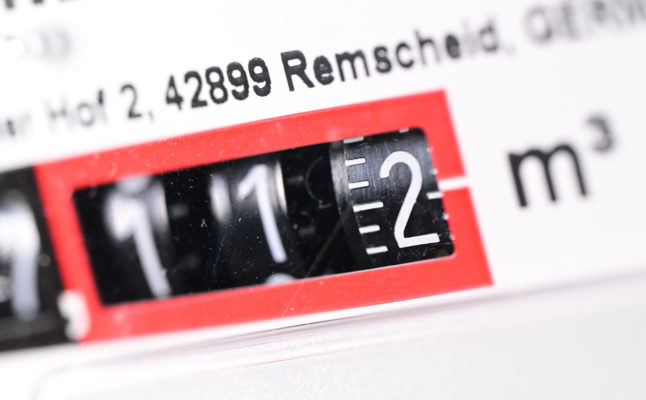EXPLAINED: How customers in Germany can tackle rising electricity bills

Gas customers aren't the only ones who are set to bear the brunt of rising energy costs - electricity bills are also on the rise in Germany. Here's what to know about the latest price hikes and what you can do about them.
Gas has been the focus of many people's worries for the coming winter, but almost unnoticed, electricity prices have been creeping up too. According to the latest estimates by price comparison sites and announcements by electricity suppliers, customers could be in for a nasty shock in the coming weeks and months.
How are electricity prices developing?
They've risen sharply. The comparison portal Verivox shows the average electricity price for private consumers in Germany in an index. According to this index, the price for an annual consumption of 4000 kilowatt hours for a model household was 41.98 cents per kilowatt hour in August, which corresponds to an increase of 38 percent compared to the same month last year. Meanwhile, price comparison portal Check24 reports an increase of around 31 percent in the same period. According to this calculation, the average price of electricity currently stands at 39.9 cents.
Why are electricity prices also going up?
"The big price driver is the price of natural gas," energy expert Udo Sieverding of the NRW consumer advice centre told DPA. Gas prices have risen mainly because Russia, Germany's most important supplier, has slashed its deliveries to Germany by around 80 percent. In addition, according to Sieverding, there are, for example, the increased world market prices for coal and increased CO2 prices, which make electricity production more expensive.
READ ALSO: 8 simple ways you can save on heating costs in Germany
What price increases can be expected, and when will they reach the end customers?
Verivox counted 123 price increases from basic suppliers for August, September and October, with an average increase of 25 percent. For a three-person household with a consumption of 4,000 kilowatt hours, this means average additional costs of €311 per year. Previously, the competitor Check24 had already reported a price increase of 47.4 percent in September.
"In view of the high wholesale prices, we expect numerous electricity price increases in the coming months, which will be an additional burden for households," says Verivox expert Thorsten Storck. The average electricity price could be 45 cents per kilowatt hour or more in the coming year. Sieverding also expects prices to rise. "We have to assume that prices will rise to over 40 cents." The end of the line, he says, has not yet been reached.
What are the big energy suppliers doing?
Germany's largest energy supplier, Eon, expects prices for end customers to continue rising.
Price pressure prevails in all markets, CFO Marc Spieker said last week, adding: "The only thing that differs is how quickly these price increases are then implemented."
There is no question that they will have to come in the end, he said. Electricity customers of the energy supplier EnBW, for example, will have to pay an average of 31.1 percent more for their household electricity in the basic supply tariff from October.
What could drive the price of electricity even higher?
The last three nuclear power plants in Germany are to be shut down at the end of the year. Accordingly, there would then be a shortage of electricity from the reactors. According to Sieverding, this could cause prices to go up yet again. Now Germany is feeling the full force of the consequences of "dragging its feet on the expansion of renewable energies", he said.

An electricity metre. Photo: picture alliance/dpa | Bernd Weißbrod
Is the government doing anything to ease the burden?
Since July, electricity customers no longer have to pay the Renewable Energy Act (EEG) levy, with the funding for green energy projects now coming directly from the state.
However, the abolition of the EEG levy has only dampened the rise in electricity prices slightly, says Storck. Further relief could come from a reduction in value-added tax on electricity, which the energy industry, for example, is demanding. So far, the federal government has only announced this measure for gas bills, which will be subject to seven percent rather than 19 percent VAT until March 31st, 2022.
READ ALSO: German electricity prices to soar by 25 percent on average
What can consumers do?
Unlike with gas, there are many individual electricity consumers in a household, says consumer advocate Sieverding. Electricity guzzlers such as old refrigerators, washing machines or halogen lamps should be replaced as soon as possible. An old heating pump can also help save energy.
The consumer advice centre offers electricity-saving tips on its website. For example, you can make your refrigerator a little less cold or defrost an iced-up freezer. You can use a lid when cooking and frying, and when using the oven you can avoid preheating it and switch it off a little earlier. And of course: switch off the light whenever you leave a room.
Comments
See Also
Gas has been the focus of many people's worries for the coming winter, but almost unnoticed, electricity prices have been creeping up too. According to the latest estimates by price comparison sites and announcements by electricity suppliers, customers could be in for a nasty shock in the coming weeks and months.
How are electricity prices developing?
They've risen sharply. The comparison portal Verivox shows the average electricity price for private consumers in Germany in an index. According to this index, the price for an annual consumption of 4000 kilowatt hours for a model household was 41.98 cents per kilowatt hour in August, which corresponds to an increase of 38 percent compared to the same month last year. Meanwhile, price comparison portal Check24 reports an increase of around 31 percent in the same period. According to this calculation, the average price of electricity currently stands at 39.9 cents.
Why are electricity prices also going up?
"The big price driver is the price of natural gas," energy expert Udo Sieverding of the NRW consumer advice centre told DPA. Gas prices have risen mainly because Russia, Germany's most important supplier, has slashed its deliveries to Germany by around 80 percent. In addition, according to Sieverding, there are, for example, the increased world market prices for coal and increased CO2 prices, which make electricity production more expensive.
READ ALSO: 8 simple ways you can save on heating costs in Germany
What price increases can be expected, and when will they reach the end customers?
Verivox counted 123 price increases from basic suppliers for August, September and October, with an average increase of 25 percent. For a three-person household with a consumption of 4,000 kilowatt hours, this means average additional costs of €311 per year. Previously, the competitor Check24 had already reported a price increase of 47.4 percent in September.
"In view of the high wholesale prices, we expect numerous electricity price increases in the coming months, which will be an additional burden for households," says Verivox expert Thorsten Storck. The average electricity price could be 45 cents per kilowatt hour or more in the coming year. Sieverding also expects prices to rise. "We have to assume that prices will rise to over 40 cents." The end of the line, he says, has not yet been reached.
What are the big energy suppliers doing?
Germany's largest energy supplier, Eon, expects prices for end customers to continue rising.
Price pressure prevails in all markets, CFO Marc Spieker said last week, adding: "The only thing that differs is how quickly these price increases are then implemented."
There is no question that they will have to come in the end, he said. Electricity customers of the energy supplier EnBW, for example, will have to pay an average of 31.1 percent more for their household electricity in the basic supply tariff from October.
What could drive the price of electricity even higher?
The last three nuclear power plants in Germany are to be shut down at the end of the year. Accordingly, there would then be a shortage of electricity from the reactors. According to Sieverding, this could cause prices to go up yet again. Now Germany is feeling the full force of the consequences of "dragging its feet on the expansion of renewable energies", he said.

Is the government doing anything to ease the burden?
Since July, electricity customers no longer have to pay the Renewable Energy Act (EEG) levy, with the funding for green energy projects now coming directly from the state.
However, the abolition of the EEG levy has only dampened the rise in electricity prices slightly, says Storck. Further relief could come from a reduction in value-added tax on electricity, which the energy industry, for example, is demanding. So far, the federal government has only announced this measure for gas bills, which will be subject to seven percent rather than 19 percent VAT until March 31st, 2022.
READ ALSO: German electricity prices to soar by 25 percent on average
What can consumers do?
Unlike with gas, there are many individual electricity consumers in a household, says consumer advocate Sieverding. Electricity guzzlers such as old refrigerators, washing machines or halogen lamps should be replaced as soon as possible. An old heating pump can also help save energy.
The consumer advice centre offers electricity-saving tips on its website. For example, you can make your refrigerator a little less cold or defrost an iced-up freezer. You can use a lid when cooking and frying, and when using the oven you can avoid preheating it and switch it off a little earlier. And of course: switch off the light whenever you leave a room.
Join the conversation in our comments section below. Share your own views and experience and if you have a question or suggestion for our journalists then email us at [email protected].
Please keep comments civil, constructive and on topic – and make sure to read our terms of use before getting involved.
Please log in here to leave a comment.